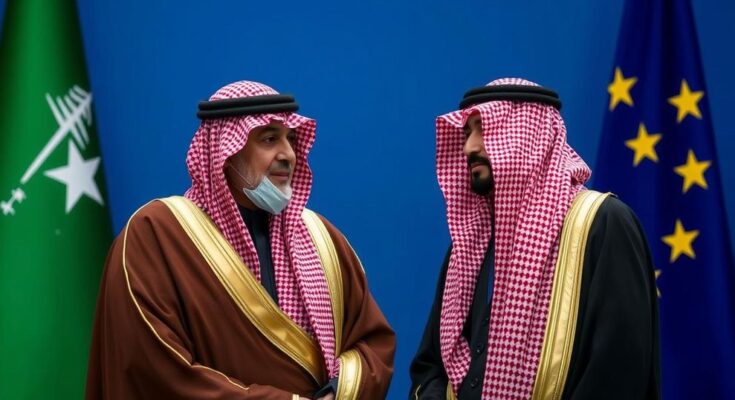Human rights groups condemn the EU’s hosting of Saudi Crown Prince Mohammed bin Salman amid his controversial past, particularly regarding the murder of journalist Jamal Khashoggi. The summit aims to enhance EU-Gulf relations but highlights tensions over issues like Ukraine and human rights. Leaders express skepticism about the meeting’s intentions, reflecting on the balance of diplomacy and accountability.
Human rights organizations have expressed strong disapproval of the European Union hosting Saudi Crown Prince Mohammed bin Salman for a summit in Brussels. This meeting, marking his return to the international stage six years after the murder of journalist Jamal Khashoggi, has sparked significant criticism. Bin Salman is joining other Gulf leaders from Bahrain, Kuwait, Oman, Qatar, and the UAE in discussions that highlight the differing perspectives of both regions on numerous issues, including Ukraine and trade relations. The summit, initiated by Charles Michel, the outgoing President of the European Council, reflects ongoing tensions. Senior EU officials acknowledge the challenge of achieving consensus among 27 member states and with Gulf representatives. When inquired about any reservations regarding inviting the crown prince, a senior EU diplomat noted such concerns were not addressed at this meeting, illustrating the complexities of diplomatic relations. US intelligence concluded in 2021 that Mohammed bin Salman had sanctioned Khashoggi’s murder, a brutal act that turned Saudi Arabia into an international pariah. Following the global condemnation and Riyadh’s denials, he slowly began reintegration into international politics, especially after the Ukraine crisis when world leaders, including President Biden, sought ties with the crown prince during their visits to Saudi Arabia. Several notable leaders, including Germany’s Chancellor Scholz and Poland’s Prime Minister Tusk, will not attend the Gulf summit, but the French President Emmanuel Macron will represent Scholz. Human Rights Watch’s Claudio Francavilla remarked on Bin Salman’s image as a reformer, yet the reality of repression in Saudi Arabia has intensified under his rule, contrasting sharply with his public persona. As of 2024, the number of executions in Saudi Arabia has soared to at least 198, the highest figure since 1990, an alarming statistic highlighted by Amnesty International. The hope for the summit is to establish a strategic relationship with Gulf nations, particularly concerning the Ukraine conflict and Middle Eastern crises, although human rights discussions remain indefinite. While acknowledging human rights as an agenda item, the EU official could not guarantee it would be raised during the talks. Meanwhile, Gulf nations displayed reluctance to include any mention of Russia in the summit’s final statement, reflecting the intricate negotiations ahead. Francavilla suggested that engagement with Gulf states could be achieved through other means without such a high-profile summit, indicating skepticism over the meeting’s true purpose and optics.
The EU’s decision to engage with Saudi Arabia, particularly under Mohammed bin Salman, has ignited a wider discourse on human rights and diplomatic ethics. With the backdrop of Khashoggi’s brutal murder and subsequent global outrage, the relationship between Western nations and Saudi Arabia reflects a delicate balancing act between human rights advocacy and geopolitical interests. The summit serves as a focal point for discussions that extend beyond mere cooperation, highlighting the challenging interplay of morality and strategy in international relations.
The EU’s summit with Crown Prince Mohammed bin Salman has drawn condemnation from human rights advocates, revealing the tension between diplomatic engagements and moral responsibilities. As Saudi Arabia seeks to restore its global image post-Khashoggi, leaders are faced with the challenge of addressing human rights while navigating complex geopolitical waters. Ultimately, this meeting underscores the broader implications of international relations in contexts fraught with ethical dilemmas, raising critical questions about the true cost of engagement.
Original Source: www.theguardian.com



